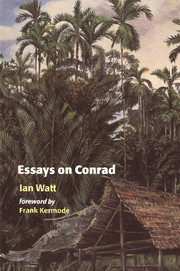Book contents
- Frontmatter
- Contents
- Foreword
- Acknowledgements
- Chapter 1 Joseph Conrad: alienation and commitment
- Chapter 2 Almayer's Folly: introduction
- Chapter 3 Conrad criticism and The Nigger of the ‘Narcissus’
- Chapter 4 Conrad's Heart of Darkness and the critics
- Chapter 5 Comedy and humour in Typhoon
- Chapter 6 The political and social background of The Secret Agent
- Chapter 7 ‘The Secret Sharer’: introduction
- Chapter 8 Conrad, James and Chance
- Chapter 9 Story and idea in Conrad's The Shadow-Line
- Chapter 10 The decline of the decline: notes on Conrad's reputation
- Chapter 11 Around Conrad's grave in the Canterbury cemetery – a retrospect
- Chapter 12 ‘The Bridge over the River Kwai’ as myth
- Index
Foreword
Frank Kermode
Published online by Cambridge University Press: 22 September 2009
- Frontmatter
- Contents
- Foreword
- Acknowledgements
- Chapter 1 Joseph Conrad: alienation and commitment
- Chapter 2 Almayer's Folly: introduction
- Chapter 3 Conrad criticism and The Nigger of the ‘Narcissus’
- Chapter 4 Conrad's Heart of Darkness and the critics
- Chapter 5 Comedy and humour in Typhoon
- Chapter 6 The political and social background of The Secret Agent
- Chapter 7 ‘The Secret Sharer’: introduction
- Chapter 8 Conrad, James and Chance
- Chapter 9 Story and idea in Conrad's The Shadow-Line
- Chapter 10 The decline of the decline: notes on Conrad's reputation
- Chapter 11 Around Conrad's grave in the Canterbury cemetery – a retrospect
- Chapter 12 ‘The Bridge over the River Kwai’ as myth
- Index
Summary
Readers of the final chapter of this book may find it surprising that the man who spent years labouring on the River Kwai should have returned after the war to an inconceivably different way of life and immediately embarked on a distinguished academic career. Little more than a decade later he published The Rise of the Novel: Studies in Defoe, Richardson and Fielding (1957). After the war years many of Watt's contemporaries, even if they had not spent them in painful captivity, found it difficult to adjust their lives to more sedate civilian routines. What readers of this collection as a whole will observe is that the strength of mind – the character – displayed in the final chapter also informs Watt's critical writing. The persistence of this quality goes some way to explaining Watt's devotion, over many years, to Conrad – an honourable stoicism that shuns illusion without being an enemy of pleasure, especially the pleasure of fine technical and aesthetic discriminations.
In The Rise of the Novel Watt maintained that realism, as he defined it, was the quality that distinguished the work of the early eighteenth-century novelists from all previous fiction. Before that period there were of course thousands of fictions, but the novel, as we know it, became possible only when the general acceptance of certain social, economic and philosophical assumptions, and the coming into existence of a literate, middle-class and predominantly Protestant audience, made possible such extraordinary works as Samuel Richardson's Clarissa (1748).
- Type
- Chapter
- Information
- Essays on Conrad , pp. vii - xiPublisher: Cambridge University PressPrint publication year: 2000



